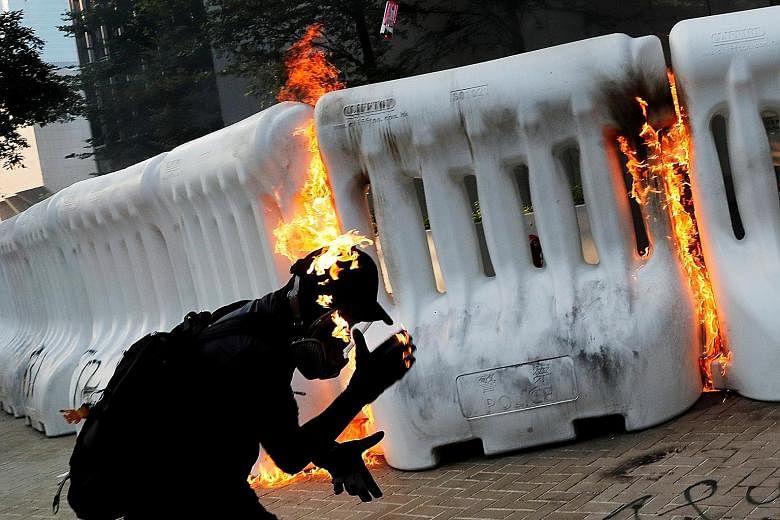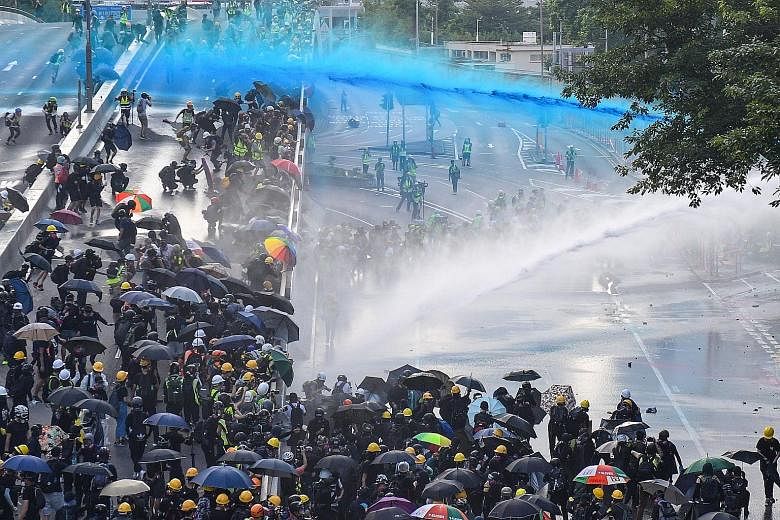HONG KONG • Hong Kong police fired tear gas and water cannon to disperse crowds yesterday, as protesters threw petrol bombs at government offices and started fires, including at the entrances of a subway station.
Tens of thousands defied a ban on a mass rally and streamed through the business district in the afternoon, some waving United States and British flags.
But the rally descended into violence when small groups of hardcore activists tried to attack the city's main government complex.
Police fired repeated volleys of tear gas and deployed water cannon trucks after Molotov cocktails and rocks were thrown over security barriers surrounding the complex, which has become a frequent flashpoint in the ongoing protests.
Some protesters threw bricks at police outside the nearby Chinese People's Liberation Army base in the city and tore down and set fire to a red banner proclaiming the 70th anniversary on Oct 1 of the founding of the People's Republic of China.
One water cannon caught fire after being hit by a petrol bomb.
"Police warn the protesters to stop their illegal acts and leave the scene immediately," police said in a statement.
Thousands of protesters, many clad in black masks, caps and shades, raced through the streets of the financial hub, engaging in cat-and-mouse tactics with the police, setting street fires and blocking roads in the heart of the city.
The authorities moved quickly to douse the fires and police fired volleys of tear gas to disperse protesters, including in the bustling shopping and tourist district of Causeway Bay. Violence erupted in the district of Fortress Hill on the east of the island as men in white T-shirts, some wielding rods, clashed with anti-government activists.
-
12.4%
-
Decline in number of passengers handled at Hong Kong's international airport last month, from a year ago.
Transport operator MTR Corp closed the Admiralty, Wan Chai and Causeway Bay stations in the evening, citing "a sudden escalation in the situation". Protesters had earlier damaged Wan Chai MTR station, setting fires to its entrances.
The Chinese-ruled territory has been rocked by more than three months of clashes, with demonstrators angry about what they see as creeping interference by Beijing in their city's affairs despite a promise of autonomy.
Earlier in the day, protesters gathered peacefully outside the British consulate, calling on Britain to rein in China. The Sino-British Joint Declaration, signed in 1984, lays out Hong Kong's future after its return to China in 1997 under a "one country, two systems" formula that ensures freedoms not enjoyed on the mainland.
"Sino-British Joint Declaration is VOID," one placard read in the protest outside the British Consulate. "SOS Hong Kong," read another. "One country, two systems is dead," protesters shouted in English.
The spark for the protests was planned legislation, now withdrawn, that would have allowed people to be sent to mainland China for trial. The protests have since broadened into calls for universal suffrage.
China says it is committed to the "one country, two systems"arrangement, denies meddling and says the city is an internal Chinese issue. It has accused foreign powers, particularly the United States and Britain, of fomenting the unrest.
Britain says it has a legal responsibility to ensure China abides by the 1984 declaration.
The protracted political chaos is taking a toll on Hong Kong's economy. The international airport handled six million passengers last month, down 12.4 per cent from a year earlier, according to figures published by the Airport Authority yesterday.
The pro-democracy movement has vowed to continue until key demands are met, including an inquiry into the police, an amnesty for those arrested and universal suffrage.
"We have a right to go to protests, to the streets, and we have to voice our demands to the government," said a secondary school student at yesterday's rally who gave his name only as Alvin.
Both Hong Kong leader Carrie Lam and Beijing have shown little appetite for making any further concessions.
Online message boards have filled with plans for new rallies and strikes in the coming weeks, fuelled by two key anniversaries. Sept 28 is the fifth anniversary of the start of the failed pro-democracy Umbrella Movement protests, while Oct 1 is the 70th anniversary of the founding of the People's Republic of China.
REUTERS, BLOOMBERG, AGENCE FRANCE-PRESSE











